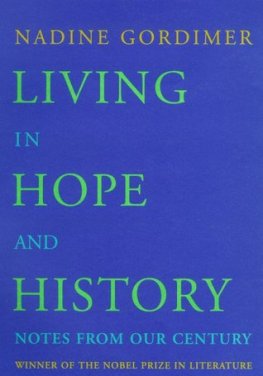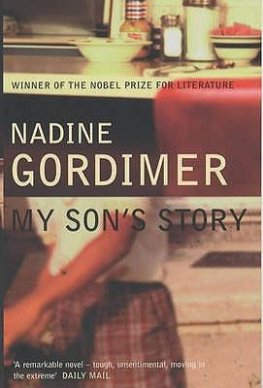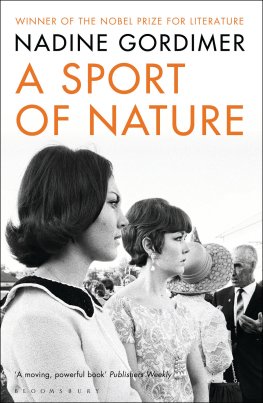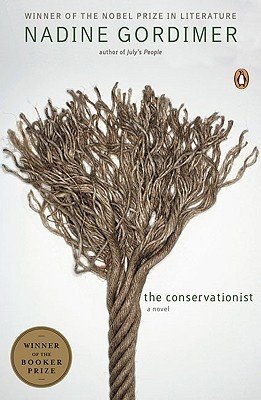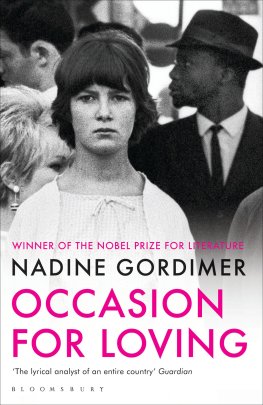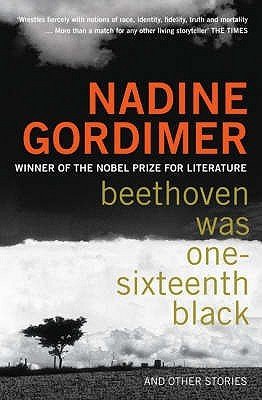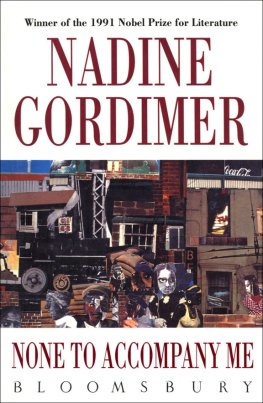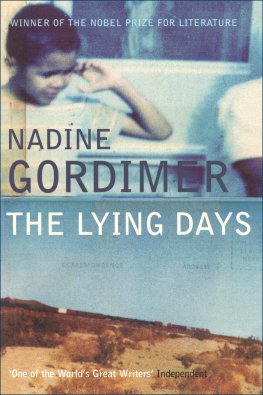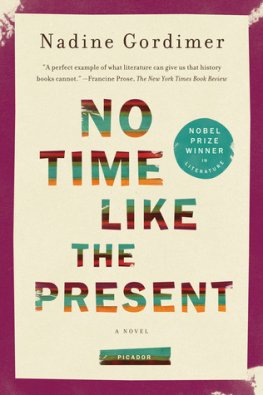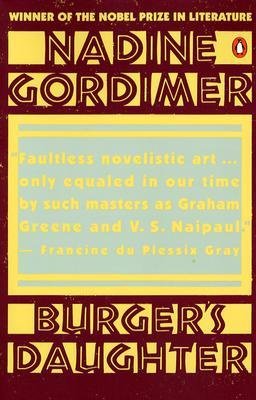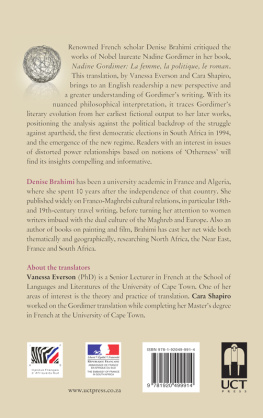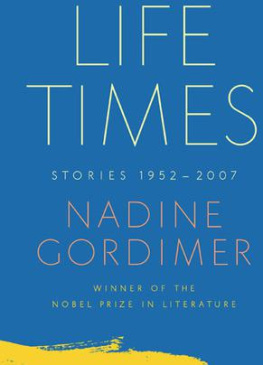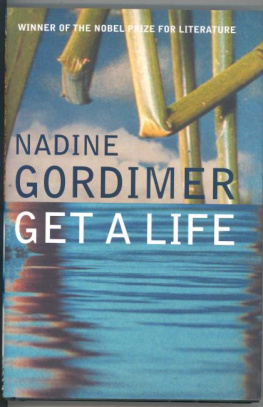Nadine Gordimer
Living in Hope and History: Notes from Our Century
For Antonin Miguet and Conrad Cassirer
The new century is theirs
One of the things a writer is for is to say the unsayable,
to speak the unspeakable, to ask difficult questions.
Salman Rushdie
History says, Dont hope
On this side of the grave,
But then, once in a lifetime
The longed-for tidal wave
Of justice can rise up,
And hope and history rhyme.
Seamus Heaney
THREE IN A BED: FICTION, MORALS, AND POLITICS
Three in a bed: its a kinky cultural affair. I had better identify the partners.
Politics and morals, as concepts, need no introduction, although their relationship is shadily ambiguous. But fiction has defining responsibilities that I shall be questioning all through what I have to say, so I shall begin right away with the basic, dictionary definition of what fiction is supposed to be.
Fiction, says the Oxford English Dictionary, is the action of feigning or inventing imaginary existences, events, states of things. . prose novels and stories collectively. So poetry, according to the OED, is not fiction. The more I ponder this, the more it amazes me; the more I challenge it. Does the poet not invent imaginary existences, events, states of things?
If I should ask any erudite and literary gathering to give examples of the powers of the poets invention of imaginary existences, events, the poets matchless evocation of states of things, all drawn, just as the prose writers is, from life the fact of life as the genie is smoked from the bottle, I could fill pages with quotations. If fiction is the suprareal spirit of the imagination, then poetry is the ultimate fiction. In speaking of fiction, I should be understood to be including poetry.
What is politics doing in bed with fiction? Morals have bedded with story-telling since the magic of the imaginative capacity developed in the human brain and in my ignorance of a scientific explanation of changes in the cerebrum or whatever, to account for this faculty, I believe it was the inkling development that here was somewhere where the truth about being alive might lie. The harsh lessons of daily existence, coexistence between human and human, with animals and nature, could be made sense of in the ordering of properties by the transforming imagination, working upon the states of things. With this faculty fully developed, great art in fiction can evolve in imaginative revelation to fit the crises of an age that comes after its own, undreamt of when it was written. Moby-Dick can now be seen as an allegory of environmental tragedy. The whale is the agent of cosmic retribution: we have sought to destroy the splendid creature that is nature, believing we could survive only by winning a battle against nature; now we see our death in the death of nature, brought about by ourselves.
But the first result of the faculty of the imagination was, of course, religion. And from the gods (what a supreme feat of the imagination they were!), establishing a divine order out of the unseen, came the secular, down-to-soil-and-toil order of morals, so that humans could somehow live together, and in balance with other creatures.
Morals are the husband/wife of fiction. And politics? Politics somehow followed morals in, picking the lock and immobilizing the alarm system. At first it was in the dark, perhaps, and fiction thought the embrace of politics was that of morals, didnt know the difference. . And this is understandable. Morals and politics have a family connection. Politics ancestry is morality way back, and generally accepted as forgotten. The resemblance is faded. In the light of morning, if fiction accepts the third presence within the sheets it is soon in full cognisance of who and what politics is.
Let me not carry my allegory too far. Just one generation further. From this kinky situation came two offspring, Conformity and Commitment. And you will know who fathered whom.
Until 1988 I would have said that the pressures to write fiction that would conform to a specific morality, whether secular or religious, long had been, could be, and were, safely ignored by writers in modern times. The Vatican still has its list of proscribed works, but in most countries one assumed there was freedom of expression so far as religion was concerned. (The exception was perhaps in certain North American schools. .)
Blasphemy? A quaint taboo, outdated, like the dashes which used to appear between the first and last letters of four-letter words. Where censorship was rigidly practised, in Eastern Europe, the Soviet Union, and South Africa, for example, the censors were concerned with what was considered politically subversive in literature, not with what might offend or subvert religious sensibilities. (In the Soviet Union these were not recognized, anyway.) This was true even in South Africa, where the Dutch Reformed Church with a particular form of Calvinistic prudery had twisted religion to the service of racism and identified the church with the security of the state, including its sexual morality based on the supposed purity of one race. A decade ago, in 1988, an actor in South Africa could not get away with exclaiming My God! in a secular context on the stage, and Jesus Christ Superstar was banned; by 1989, savage satire of the church and its morality was ignored. As for sexual permissiveness, full frontal nudity in films was not snipped by the censors scissors.
But in holding this illusion about freedom of expression in terms of religious and sexual morality, I was falling into the ignorance Islam finds reprehensible in the Judeo-Christian-atheist world (more strange bedfellows) that worlds ignorance of the absolute conformity to religious taboos that is sacred to Islam. And here Islam was right; I should have known that this kind of censorship was not evolving into tolerance, least of the rights of non-Muslim countries to grant their citizens the freedom of disbelief, but was instead becoming an international gale force of growing religious fanaticism. Then came the holy war against The Satanic Verses, in which the enemy was a single fiction, a single writer, and the might and money of the Islamic world were deployed in the fatwa: death to Salman Rushdie.
Now I, and other writers, were stunned to know that situations were back with us where religious persecution the denial of peoples right to follow their faith in freedom is turned on its head, and religion persecutes freedom not alone freedom of expression but a writers freedom of movement, finally a writers right to life itself. Now in a new decade, with freedoms rising, we see that while a writer becomes president in one country, another writer is being hounded to death throughout the world. We see how a religion has the power to terrorize, through its followers, across all frontiers. Political refugees from repressive regimes may seek asylum elsewhere; Salman Rushdie has nowhere to go. Islams edict of death takes terrorist jurisdiction everywhere, contemptuous of the laws of any country.
Pre-Freudian hypocrisy, puritan prudery may be forgotten. The horror of what has happened to Rushdie is a hand fallen heavily on the shoulder of fiction: pressures to write in conformity with a specific morality still can arrive, and pursue with incredible vindictiveness, even if this is unlikely to happen to most writers.
Am I positing that morals should be divorced from fiction? That fiction is free of any moral obligation? No. Fictions morality lies in taking the freedom to explore and examine contemporary morals, including moral systems such as religions, with unafraid honesty.
This has not been an easy relationship, whether in the ghastly extreme of Salman Rushdies experience or, say, that of Gustave Flaubert, who, commenting on the indecency case against

